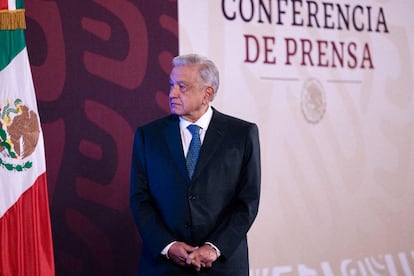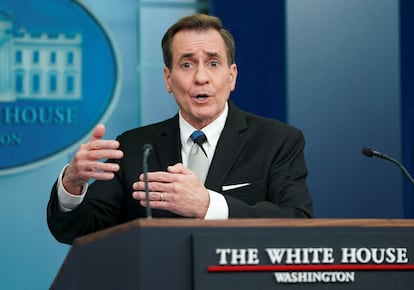United States confirms that it is not investigating Mexican President López Obrador
The White House insists that it has a good relationship with Mexico’s government, after ‘The New York Times’ published a report based on DEA probes into whether drug traffickers contributed money to the president’s campaign

The United States is not investigating Mexican President Andrés Manuel López Obrador. That was confirmed by John Kirby, the White House spokesperson for international affairs. “There is no investigation into President López Obrador,” he said firmly at teleconference on Thursday. His statements come after The New York Times published a report based on the investigations of the U.S. Drug Enforcement Agency (DEA) and informant testimony into millions of dollars the Mexican president’s campaign allegedly received in 2018. The Joe Biden administration, however, has insisted that the U.S. and Mexico have a strong relationship, and work closely together in areas such as migration and border control.
“We continue to work with Mr. López Obrador’s administration to do what we can to deal with this unprecedented migration in the hemisphere and the situation at the border, which continues to be a key focus for President Biden and for this administration,” said Kirby. In response, López Obrador’s political party, Morena, said: “Once again, the smear campaign that has been launched against our president is denied.”
The report from The New York Times, however, made it clear that the allegations from the informants and the payments tracked by the DEA never led to a formal investigation, despite the fact that they were tracked for years.
“The United States never opened a formal investigation into Mr. López Obrador, and the officials involved ultimately shelved the inquiry. They concluded that the U.S. government had little appetite to pursue allegations against the leader of one of America’s top allies,” the article states, arguing that the White House did not want to risk its bilateral relationship with Mexico, a key ally in the fight against drug trafficking and the immigration crisis.
On Thursday, Kirby referred to the statements made by the Department of Justice, which also denied that the U.S. government had opened any investigation into links between drug trafficking and the financing of the then-presidential candidate’s election campaign. López Obrador’s supporters in Mexico have taken Kirby’s comments as proof that The New York Times lied, despite the fact that it is the newspaper itself that stated that a formal case was never opened and that, at the time, the American authorities were not able to find a direct link between the president and criminal groups.

The scandal began even before the publication of the report. In his morning press conference, López Obrador read an email sent by Natalie Kitroeff, The New York Times’ bureau chief in Mexico, requesting a comment about the claims made in the article. The Mexican president called the newspaper “professional slanderers” and publicly recited her phone number. “All this is completely false,” said the president.
The New York Times report claims that, according to informants, the president’s children and close collaborators received millions of dollars from the drug cartel Los Zetas and Ismael “El Mayo” Zambada, the founder of the Sinaloa Cartel. It also states that U.S. officials tracked payments made by people linked to the Sinaloa Cartel to intermediaries for the Mexican government. At least one of the banking operations coincided with the president’s visit to Sinaloa, where he met the mother of Mexican drug capo Joaquín “El Chapo” Guzmán.
The newspaper has defended the report and condemned the president’s reaction disclosing one of its reporter’s phone number. “This is a troubling and unacceptable tactic from a world leader at a time when threats against journalists are on the rise,” said The New York Times, which chose to publish the investigation a couple of hours after López Obrador’s press conference. Mexico’s freedom of information institute, The National Transparency Institute (INAI) said Thursday it would open an investigation against López Obrador for disclosing the personal data of The New York Times journalist.
That same Thursday, U.S. Secretary of State Antony Blinken, and his Mexican counterpart, Alicia Bárcena, met at the G20 summit in Brazil. “Delighted to meet with you and the White House team to continue our excellent dialogue and bilateral agreements,” Bárcena wrote. EL PAÍS asked the Mexican Foreign Ministry if the report had been discussed, but did not receive a response. No press reports in Washington say that the matter was discussed. In a statement, Mexican authorities said that Blinken and Bárcena “reviewed the state of bilateral relations and exchanged points of view on various issues of the international situation.”
“The dirty war campaign against our movement is so crude that the U.S. government came out for the second time to clarify that there is no investigation against the president,” said Claudia Sheinbaum, the official presidential candidate for Morena, in reference to a report published by ProPublica portal at the end of January, which made similar accusations against López Obrador, but with respect to his 2006 presidential campaign. After that publication, Washington opted for a similar response, while the Mexican government described the report as a “slander.”
Marcelo Ebrard, the former secretary of foreign affairs and a former presidential candidate for Morena, said that “the DEA is a headache in Mexico” and that the anti-drug agency “has often endangered the bilateral relationship” by giving credibility to the testimonies of informants. “It’s the DEA’s revenge for the legal obligations that have been imposed on them in Mexico,” Ebrard said, blaming the agency for leaking the informants’ testimony.
The controversy one year after Genaro García Luna, the secretary of public security during the Mexican government of Felipe Calderón (2006-2012), was found guilty in New York of three drug trafficking crimes, one for organized crime and another for giving false statements. Supporters of the López Obrador government celebrated the ruling, while the opposition argued that no evidence was presented at the trial to prove García Luna’s guilt. Now, with the president in the spotlight, the situation is reversed. The government claims that this case is different as the accusations have not been proven in court, while opposition groups have jumped on the allegations, spreading the #narcopresident hashtag on social media.
What has shaken the political table in Mexico has barely made waves in the United States. Virtually no U.S. official, except Kirby, has spoken about the issue. It remains to be seen what impact it will have on the bilateral relationship, which was hurt after the publication of the ProPublica report. The report on the alleged links between drug traffickers and members of Mexico’s current administration come days before the start of Mexico’s presidential campaign, which begins on March 1. Mexico will head to the polls on June 2, while the U.S. presidential elections are scheduled for November 5.
Sign up for our weekly newsletter to get more English-language news coverage from EL PAÍS USA Edition
Tu suscripción se está usando en otro dispositivo
¿Quieres añadir otro usuario a tu suscripción?
Si continúas leyendo en este dispositivo, no se podrá leer en el otro.
FlechaTu suscripción se está usando en otro dispositivo y solo puedes acceder a EL PAÍS desde un dispositivo a la vez.
Si quieres compartir tu cuenta, cambia tu suscripción a la modalidad Premium, así podrás añadir otro usuario. Cada uno accederá con su propia cuenta de email, lo que os permitirá personalizar vuestra experiencia en EL PAÍS.
¿Tienes una suscripción de empresa? Accede aquí para contratar más cuentas.
En el caso de no saber quién está usando tu cuenta, te recomendamos cambiar tu contraseña aquí.
Si decides continuar compartiendo tu cuenta, este mensaje se mostrará en tu dispositivo y en el de la otra persona que está usando tu cuenta de forma indefinida, afectando a tu experiencia de lectura. Puedes consultar aquí los términos y condiciones de la suscripción digital.








































